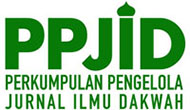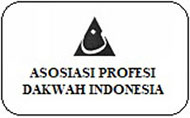Marketing Da’wah through New Media at the "Teras Dakwah” (Da’wah Terrace) Yogyakarta, Indonesia
Abstract
Full Text:
PDFReferences
Bamualim, Chaider S. dan dkk. (2018). Kaum Muda Muslim Milenial: Konservatisme, Hibridasi Identitas, dan Tantangan Radikalisme. Pusat Kajian Agama dan Budaya UIN Syarif Hidayatullah.
Beta, A. R. (2014). No Title. Hijabers: How Young Urban Muslim Women Redefine Themselves in Indonesia, 76(4–5), 337.
Echchaibi, N. (2011). From Audio Tapes to Vidio Blogs: the Delecalisation of Authority in Islam. School of Journalism and Mass Communication University of Colorado: Boulder, 17(1), 25–44.
Eichelman, D. F., & Anderson, J. W. (2003). New Media in the Muslim World: The Emerging Public Sphere. In Indiana University Press. Indiana University Press.
Einstein, M. (2008). Brand of Faith: Marketing Religious in a Commercial Age. Routledge.
Gautheir, Francois, Woodhead, L., & Martinainen, T. (2013). Gauthier,. In Francois Gauthier & T. Martikainen (Eds.), Religion in Consumer Society: Brands, Consumers, and Markets (pp. 1–26). Ashgate.
H. A. Innis. (1951). The Bias of Communication. University of Toronto Press.
Han, M. I. (2018). Anak Muda, Dakwah Jalanan dan Fragmentasi Otoritas Keagamaan: Studi Atas Gerakan Dakwah Pemuda Hijrah dan Pemuda Hidayah. UIN Sunan Kalijaga.
Hasan, N. (2006). Laskar Jihad, Islam, Militancy, and Quest for Identity in Post-New Order Indonesia. Cornell Southeast Asia Program.
Hasan, N. (2009). The Making of Public Islam: Piety, Agency and Commodification on the Landscape of the Indonesia Public Sphere. Contemporary Islam, 3(3), 229–250.
Herrera, L., & Bayat, A. (2010). Conclusion: Knowing Muslim Youth. Being Young and Muslim in Neoliberal Times: New Cultural Politics in the Global South and North, 355–364.
Hoesterey, J. B. (2008). Marketing Morality: The Rise, Fall, and Rebranding of Aa Gym. In G. Fealy & S. White (Eds.), In Expressing Islam: Religious Life and Politics in Indonesia (pp. 95–114). Institute of Southeast Asian Studies.
Hoesterey, J. B. (2018). Marketing Islam: Entrepreneurial Ethics and the of Capitalism in Indonesia. Spring, 10, 1–14.
Howell, J. D. (2012). 'Calling and Training': Role Innovation and Religious De-Differentiation in Commercialised Indonesia Islam. Journal of Contemporary Religion, 28(3), 414–416.
Jones, C. (2010). Materializing piety: Gendered anxieties about faithful consumption in contemporary urban Indonesia. American Ethnologist, 37(4), 617–637.
Kailani, N. (2012). Forum Lingkar Pena and Muslim youth in contemporary Indonesia. RIMA: Review of Indonesian and Malaysian Affairs, 46(1), 33. https://search.informit.com.au/documentSummary;dn=984332214396280;res=IELAPA
Kailani, N. (2021). Creating Entrepreneurial and Pious Muslim Subjectivity in Globalised Indonesia. In L. C. Sebastian, S. Hasim, & A. R. Arifianto (Eds.), Rising Islamic Conservatism in Indonesia: Islamic Group and Identity Politics (p. 199). Routledge.
Kailani, N., & Slama, M. (2019). Accelerating Islamic Charities in Indonesia: Zakat, Sedekah and the Immediacy of Social Media. Southeast Asia Research, 2–18.
Kailani, N., & Sunarwoto. (2019). Televangelisme Islam dalam Lanskap Otoritas Keagamaan Baru. In N. Hasan (Ed.), Ulama dan Negara-Bangsa: Membaca Masa Depan Politik Islam di Indonesia (pp. 179–206). Suka Perss.
Kaptein, N. J. G. (2004). The Voice of the Ulama : Fatwas and Religious Authority in Indonesia. JSTOR, 49(125), 115–130.
Kiptiyah, S. M. (2018). Ulama Jawa, Otoritas Agama, dan Tafsir Al-Quran,” dalam Islam antara Teks, Kuasa dan Identitas. In Sunarwoto (Ed.), Islam antara Teks, Kuasa dan Identitas (p. 16). Arti Bumi Intara.
Lyansari, K. N. (2018). Hijrah Celebrity Creating New Religiosities, Branding Economics of Lifestyle in the Age of Muslim Mass Consumption. Analisis: Jurnal Studi Keislaman, 18(2), 211–232. http://www.ejournal.radenintan.ac.id/index.php/analisis/article/view/3066
Muzakki, A. (2008). Islam as a Symbolic Commodity: Transmitting and Consuming Islam Through Public Sermons in Indonesia. In religious Commodificaution In Asia: Marketing Good (Pattana Ki, pp. 205–219).
Pribadi, Y. (2013). RELIGIOUS NETWORKS IN MADURA: Pesantren, Nahdatul Ulama and Kiai as the Core of Santri Culture. Al-Jami’ah Journal of Islamic Studies, 51(1), 1–31.
Pribadi, Y. (2019). Fragmentasi Umat dan Penciptaan Otoritas Keagamaan: Tanggapan terhadap Islam Lokal dan Islam Asia di Indonesia. Jurnal Masyarakat & Budaya, 20(1), 103–120.
Bull, R.L.(2008). Commodification of Religion and the “religification” of Commodities. In Commodifications in Asia: Marketing Good (pp. 220–234). Routledge.
Rosidi, I. (2021). Da'wah and Politics among Muslim Preachers in Contemporary Indonesia. Intellectual Discourse, 29 (1), 35-52.
Rosidi, I., Yazid, Y., & Amril. (2021). The Fragmentation of Religious Authority in Provincial Towns in Indonesia: The Case of the Mui (Indonesian Muslim Scholars Council) in Pekanbaru and Pontianak. Manusya: Journal of Humanities, 24 (2), 185-203.
Rosyad, R. (2006). A Quest for True Islam: A Study of the Islam Resurgence Movement among the Youth in Bandung. ANU E Press.
Saputra, E. (2019). Menelisik Radikalisme Gen Z Perempuan di Facebook. Islamica: Jurnal Studi Keislaman, 14(1), 103–130.
Savatore, A., & Echelman, D. (2004). Public Islam and The Common Good (1st ed.). Brill.
Sunarwoto. (2012). Radio Fatwa: Islam Tanya Jawab Programmes on Radio Dakwah. Al-Jami’ah Journal of Islamic Studies, 239–278(50), 2.
Sunesti, Y., Hasan, N., & Muhammad Najib Azca. (2018). Young Salafi-Niqabi and Hijrah Agency and identity Negotiation. Indonesia Jurnal of Islam and Muslim Society, 8(2), 173–197.
Triantoro, D. A. (2018). Dakwah dan Kesalehan: Studi Tentang Gerakan Teras Dakwah Di Kota Yogyakarta. Jurnal Masyarakat & Budaya, 20(2), 273–286.
Triantoro, D. A. (2019). Ustaz Abdul Somad: Ustaz Karismatik Dunia Digital. Omah Ilmu.
Turner, B. S. (2007). Religious Authority and the New Media. Theory, Culture & Society, 24(2), 117–134.
Watson, C. . (2005a). A Popular Indonesia Preacher: The Significant of Aa Gymnatsiar. Journal of The Royal Anthropological Institute, 11(4), 773–792.
Watson, C. . (2005b). Islamic Books and Their Publishers: Notes on the Contemporary Indonesian Science. Journal of Islamic Studies, 16(2).
Weng, H. W. (2018). The Art of Dakwah: Social Media, Visual Persuasion and the Islamist Propagation of Felix Siauw. Indonesia and the Malay World, 46(134), 61–79.
Williams, R. (2003). Technology and Cultural Form. Routledge.
Zaman, M. Q. (2002). The Ulama Contemporary Islam: Custodians of Change. Princeton University Press.
DOI: http://dx.doi.org/10.24014/jdr.v33i1.18159
Refbacks
- There are currently no refbacks.

This work is licensed under a Creative Commons Attribution-ShareAlike 4.0 International License.
Editorial Office:
2nd Floor, Building of Faculty of Da'wah and Communication, Universitas Islam Negeri Sultan Syarif Kasim Riau. Jl. HR Soebrantas Km 15, Simpangbaru, Tampan, Pekanbaru
Email : jurnalrisalah@uin-suska.ac.id

This work is licensed under a Creative Commons Attribution-ShareAlike 4.0 International License.














